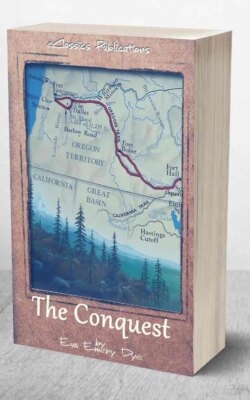Читать книгу The Conquest: The True Story of Lewis & Clark - Eva Emery Dye - Страница 23
На сайте Литреса книга снята с продажи.
Chapter XVIII – ON THE RAMPARTS
ОглавлениеIn all his anguish about Detroit, with the energy of desperation Clark now set to work making Louisville stronger than ever.
"Boys, we must have defences absolutely impregnable; we know not at what moment cannon may be booming at our gates."
A new stronghold was founded, and around it a moat eight feet deep and ten feet wide; surrounding the moat itself, was built a breastwork of log pens, filled with earth and picketed ten feet high on top of the breastwork. An acre was thus enclosed, and in that acre was a spring that bubbles still in the streets of Louisville. Within were mounted a double six-pounder captured at Vincennes, four cannon, and eight swivels, and heaped around were shells, balls, and grapeshot brought for the Detroit campaign. With bakehouse and blockhouse, bastion and barrack, no enemy ever dared attack Fort Nelson.
"General Clark is too hard on the militia," the soldier boys complained, but the hammering and pounding and digging went on until Louisville was the strongest point beyond the Alleghanies.
Back and back came the Indians, in battles and forays, and still in this troublous time settlers were venturing by flatboat and over the Wilderness Road into the Blue Grass country. They seemed to fancy that Clark had stilled the West, that here the cannon had ceased to rattle.
Emigrants on packhorses bound for the land of cane and turkeys saw bodies of scalped white men every day. Logan and his forest rangers, like knights of old, guarded the Wilderness Road. Kenton and his scouts patrolled the Ohio, crossing and recrossing on the track of marauding savages. Boone watched the Licking; Floyd held the Bear Grass.
Fort Nelson was done,—its walls were cannon-proof. Clark's gunboat lay on the water-front when a messenger passed the sentinel with a letter.
In the little square room that Clark called his headquarters, the envoy waited. The young commandant read and bowed his head,—was it a moment of irresolution? "Who could have brought this letter?"
"Any Indian would bring it for a pint of rum," answered a well-known voice. Pulling off a mask, Connolly stood before him.
It was as if Lord Dunmore had risen from the floor,—Connolly had been Lord Dunmore's captain commandant of all the land west of the Blue Ridge. What was he saying?
"As much boundary of land on the west bank of the Ohio as you may wish, and any title under that of a duke, if you will abandon Louisville. I am sent to you by Hamilton."
"What!" gasped Clark. "Shall I become an Arnold and give up my country? Never! Go, sir, before my people discover your identity."
Resolved to lock the secret in his own heart, Clark spoke to no one. But that same night a similar offer was made to John Floyd on the Bear Grass. He mentioned it to Clark.
"We must never tell the men," they agreed; "starving and discouraged they might grasp the offer to escape the Indian tomahawk." But years after Clark told his sister Lucy, and Floyd told his wife, Jane Buchanan,—and from them the tale came down to us.
As if enraged at this refusal, British and Indians rallied for a final onslaught.
"The white men are taking the fair Kain-tuck-ee, the land of deer and buffalo. If you beat Clark this time you will certainly recover your hunting-grounds," said De Peyster at the council fire.
In unprecedented numbers the redmen crossed the Ohio,—station after station was invested; then followed the frightful battle of Blue Licks where sixty white men fell in ten minutes. Kentucky was shrouded in mourning.
Again Clark followed swift with a thousand mounted riflemen.
Among the Indians dividing their spoils and their captives there sounded a sharp alarm, "The Long Knives! The Long Knives!"
"A mighty army on its march!"
Barely had the Shawnees time to fly when Clark's famished Kentuckians entered Old Chillicothe. Fires were yet burning, corn was on the roasting sticks, but the foe was gone.
"The property destroyed was of great amount, and the quantity of provisions burned surpassed all idea we had of the Indian stores," Clark said in after years.
This second destruction of their villages and cornfields chilled the heart of the Indians. Their power was broken. Never again did a great army cross the Ohio.
But standing again on the ruins of Old Chillicothe, "I swear vengeance!" cried the young Tecumseh.
And Clark, the Long Knife, mourned in his heart.
"This might have been avoided! this might have been avoided! Never shall we have peace on this frontier until Detroit is taken!"
